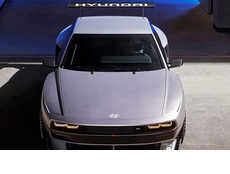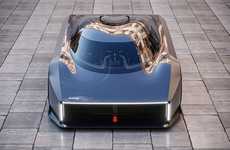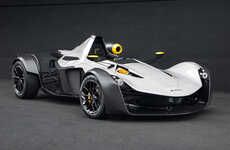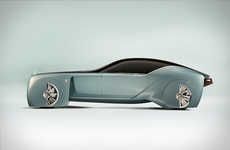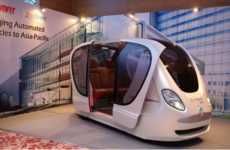
The Hyundai RM16's Low Center of Gravity Allows For Improved Handling
Rahul Kalvapalle — June 10, 2016 — Autos
References: globalpr.hyundai & gizmag
As far as performance cars go, they don't come about better and more comprehensively engineered than Hyundai's brand new RM16. The latest addition to the automaker's RM series, this particular vehicle borrows features from its predecessors the RM14 and RM15 but makes use of the latest automotive technologies to improve performance.
This particular performance car concept comes equipped with a 2.0-liter theta T-GDI engine that works in conjunction with a six-speed manual transmission setup that places control over handling and speed squarely in the hands of the driver. This vehicle features weight-saving technologies that improve balance and acceleration by shifting the center of gravity to less than 500 mm from the ground.
The Hyundai RM16 is a triumph in modern automotive engineering in that it blends an aerodynamic design with a lightweight structure, something that improves both acceleration and handling.
This particular performance car concept comes equipped with a 2.0-liter theta T-GDI engine that works in conjunction with a six-speed manual transmission setup that places control over handling and speed squarely in the hands of the driver. This vehicle features weight-saving technologies that improve balance and acceleration by shifting the center of gravity to less than 500 mm from the ground.
The Hyundai RM16 is a triumph in modern automotive engineering in that it blends an aerodynamic design with a lightweight structure, something that improves both acceleration and handling.
Trend Themes
1. Performance Car Concepts - Innovative performance car concepts like Hyundai's RM16 provide opportunities for disruptive innovation by incorporating advanced automotive technologies and lightweight structures.
2. Weight-saving Technologies - The use of weight-saving technologies in performance cars, such as the Hyundai RM16's low center of gravity, presents opportunities for disruptive innovation by improving balance, acceleration, and handling.
3. Aerodynamic Design - Aerodynamic designs in performance cars, like the Hyundai RM16, offer disruptive innovation opportunities for improved acceleration and handling through reduced air resistance.
Industry Implications
1. Automotive Engineering - The automotive engineering industry can explore disruptive innovation opportunities by incorporating advanced technologies and lightweight structures in performance cars.
2. Automotive Technologies - The automotive technologies industry has the potential for disruptive innovation by developing weight-saving technologies that improve balance, acceleration, and handling in performance cars.
3. Automotive Design - The automotive design industry can embrace disruptive innovation opportunities by focusing on aerodynamic designs to enhance acceleration and handling in performance cars.
3.6
Score
Popularity
Activity
Freshness




